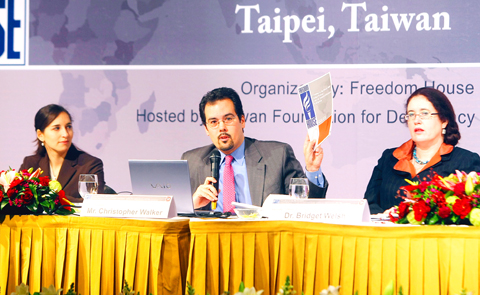While ranking Taiwan as a free country in its annual Freedom in the World 2009 report, the US-based Freedom House said this year was a pivotal year in the country’s democratic development.
Dubbing Taiwan as a “vibrant democracy” and “one of Asia’s success stories,” Sarah Cook, an Asia Researcher with Freedom House, told a press conference in Taipei that this year would be a crucial test of whether the nation’s self-correcting mechanisms would kick in to ensure that judicial independence and the due process of law are upheld.
The group expressed concern over the heavy-handed police action and the obstruction of protesters’ freedom of expression and assembly during the visit by Chinese envoy Chen Yun-lin (陳雲林) last November.

PHOTO: CNA
Estimates put the number of injured during that week at more than 100 people, including protesters and police officers. Several people reported being beaten by police.
Police also prohibited people from carrying Republic of China flags and shut down a record store for playing a pro-Taiwan song.
To date, the government has not apologized for reports of police brutality and argued that an independent commission to probe the issue was unnecessary because such tasks fall under the jurisdiction of the Control Yuan.
Cook said the Freedom House and other international human rights organization would monitor judicial impartiality in the case against former president Chen Shui-bian (陳水扁), due process rights for the general public, as well as the nation’s self-correcting mechanisms.
The group said that its freedom rating is based on an overall evaluation of a country’s democratic process and institutional trend rather than on isolated incidents. On a scale of one to seven, one being the most free and seven the least free, Taiwan received a two in political rights and a once in civil liberties — the same rating it was given last year.
This year’s report covered 89 countries, or 46 percent of the 193 nations in the world.
The number of “free” countries, the group said, declined by one from the previous year’s survey. North Korea was rated as the least free, while Finland topped the list as most free.
The group said that last year saw a regression in freedom in sub-Saharan Africa and the former Soviet Union states.
South Asia, however, showed the most improvement, with Pakistan, the Maldives and Bhutan recording progress linked to elections.
Other Asian countries, such as Afghanistan, Myanmar, Fiji and Papua New Guinea, Singapore and Tibet dropped in the scale.
China’s increased repression instead of promoting human rights reform as it had pledged in connection to hosting the Summer Olympics saw it score seven in political rights and six in civil liberties.
Freedom House director of studies Christopher Walker said the global economic slump presents a severe challenge to many countries but the effects of the financial crisis have yet to be seen.
This is the first time Freedom House released its annual Freedom in the World report in Asia, and Taiwan was chosen as the venue because the group regarded it as one of the most “vibrant democracies” in the region.

Chinese Nationalist Party (KMT) Chairman Eric Chu (朱立倫), spokeswoman Yang Chih-yu (楊智伃) and Legislator Hsieh Lung-chieh (謝龍介) would be summoned by police for questioning for leading an illegal assembly on Thursday evening last week, Minister of the Interior Liu Shyh-fang (劉世芳) said today. The three KMT officials led an assembly outside the Taipei City Prosecutors’ Office, a restricted area where public assembly is not allowed, protesting the questioning of several KMT staff and searches of KMT headquarters and offices in a recall petition forgery case. Chu, Yang and Hsieh are all suspected of contravening the Assembly and Parade Act (集會遊行法) by holding

PRAISE: Japanese visitor Takashi Kubota said the Taiwanese temple architecture images showcased in the AI Art Gallery were the most impressive displays he saw Taiwan does not have an official pavilion at the World Expo in Osaka, Japan, because of its diplomatic predicament, but the government-backed Tech World pavilion is drawing interest with its unique recreations of works by Taiwanese artists. The pavilion features an artificial intelligence (AI)-based art gallery showcasing works of famous Taiwanese artists from the Japanese colonial period using innovative technologies. Among its main simulated displays are Eastern gouache paintings by Chen Chin (陳進), Lin Yu-shan (林玉山) and Kuo Hsueh-hu (郭雪湖), who were the three young Taiwanese painters selected for the East Asian Painting exhibition in 1927. Gouache is a water-based

Taiwan would welcome the return of Honduras as a diplomatic ally if its next president decides to make such a move, Minister of Foreign Affairs Lin Chia-lung (林佳龍) said yesterday. “Of course, we would welcome Honduras if they want to restore diplomatic ties with Taiwan after their elections,” Lin said at a meeting of the legislature’s Foreign Affairs and National Defense Committee, when asked to comment on statements made by two of the three Honduran presidential candidates during the presidential campaign in the Central American country. Taiwan is paying close attention to the region as a whole in the wake of a

OFF-TARGET: More than 30,000 participants were expected to take part in the Games next month, but only 6,550 foreign and 19,400 Taiwanese athletes have registered Taipei city councilors yesterday blasted the organizers of next month’s World Masters Games over sudden timetable and venue changes, which they said have caused thousands of participants to back out of the international sporting event, among other organizational issues. They also cited visa delays and political interference by China as reasons many foreign athletes are requesting refunds for the event, to be held from May 17 to 30. Jointly organized by the Taipei and New Taipei City governments, the games have been rocked by numerous controversies since preparations began in 2020. Taipei City Councilor Lin Yen-feng (林延鳳) said yesterday that new measures by